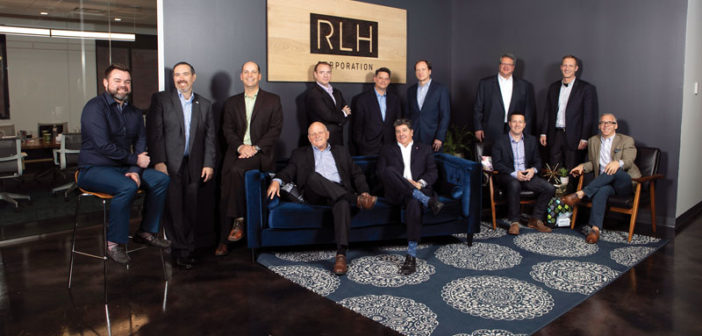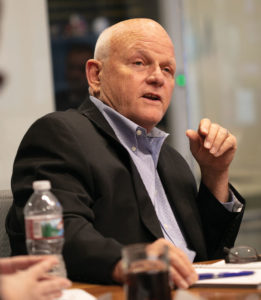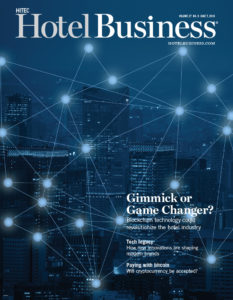DENVER—When done right, technology can be a great way for owners, operators and brands to make their guests’ stays the best they can be. But there are many pitfalls that can keep that technology from being flawless, frictionless and seamless.
Held at RLH Corporation headquarters, the Hotel Business Executive Roundtable “Tech Legacy: How new innovations are shaping modern brands” allowed 12 industry executives to share their varying opinions on the topic. The roundtable was hosted and sponsored by RLH Corp. with supporting sponsorship by Arthur J. Gallagher & Co. Real Estate and Hospitality Services.
Nicole Carlino, Hotel Business’ managing editor and moderator of the roundtable, opened the session by posing the question, “What role does technology play in what an owner wants to see in a brand they are going to invest in?”
“Today, hotels are not just focused on design, they are focused on the program, and that has become an important differentiator in the industry, so the technology has to support that,” said Paul Sacco, chief development officer of upscale brands with RLH. “It is not just about the room, it is about a terrific common-space experience, and that common space has to allow guests, who are increasingly accustomed to using newer technologies, to enjoy the space, whether it is mobile check-in or, like in our Hotel RLs, an iPad check-in. The new hotel program has to be conducive to those technologies.”
Steve Van, president/CEO of Prism Hotels & Resorts, said that most operators, owners and developers are looking for a competitive advantage. “Most technological breakthroughs end up being a defensive policy. You just have them because everyone else does,” he said. “What is interesting is using technology differently to get guests in hotels. That would be a competitive advantage that is harder to reproduce than just, ‘We’re gonna have iPhone check-in, too.’ Once something happens in the business, everybody has got it and they go by the wayside. What you are really looking for is not even a breakthrough technology, but something that is used in a different way.”
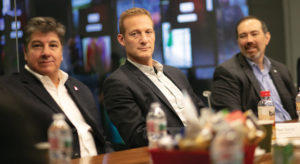
LEFT TO RIGHT: Walter Barela, Peak Hospitality LLC; Paul Sacco, RLH Corporation; Michael Blake, HTNG
Finding that technological breakthrough is getting harder and harder as technology is making leaps and bounds, especially at guests’ homes. “Basically, it used to be that when you stayed at hotels, you saw new things in technology and you wanted to bring them home,” said Walter Barela, principal with Peak Hospitality LLC. “Now, I think it has gotten to the point where we have so much technology in our homes, we tend to expect and want it in a hotel.”
Most participants agreed that most importantly—just like at home—guests want seamless connectivity. “Our research shows that there are four key components with the guest,” said Joseph Bojanowski, president of PM Hotel Group. “The first is that they be connected to their family and their home when they arrive at the hotel. We need a really good phone signal. I want to call my family. I want to let them know that I am there and I want a really good connection on the internet. Second, I want to be connected to work if I am there for business, so give me an easy way to get on, and don’t make it difficult for me to figure out how… The third is connected to the hotel—I want to know what is going on there. I want to be able to see some menus, I want the hours of operation of the fitness center or pool. The fourth is around the trend of everyone wanting to have an experiential component; let me know what is going on somehow so I can make some decisions. It is our responsibility to figure out how to deliver that to them in a seamless, uncomplicated way.”
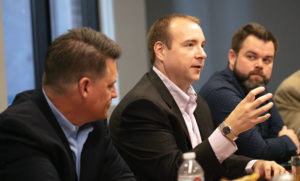
LEFT TO RIGHT: Brian Fry, Commonwealth Hotels LLC; Chris Cheney, Stonebridge Companies; and Blake Hart, Kokua Hospitality
Blake Hart, e-commerce manager with Kokua Hospitality, agreed that seamless connectivity is extremely important. “We have seen at many of our hotels where guests just want seamless connectivity,” he said. “They can sign in simply and not have to download an app that makes them feel like they are providing their personal information to the hotel.”
It is important that the connectivity can meet every guests’ needs, no matter the generation. “You have to have a technology that is easy enough to use for grandma and grandpa, plus flexible enough for my kids and everyone in between,” said Brian Fry, president of Commonwealth Hotels LLC. “One thing where we get ourselves into trouble with brands sometimes is that the desire is to funnel all of the guests through one platform, through one program for the brand’s purposes, rather than accept the fact that the guests want to interact with technology on their own terms. Finding a way to do that better is a real opportunity.”
As the only broker on the panel, Mike Cahill, CEO/founder of HREC, had a question of his own for the rest of the panel. “Technology—is that considered primarily the responsibility of the brand versus the operator? What does the operator do to advance technology, or is everyone just relying on the brand, and the operator follows the brand?”
There was no simple answer to the question. “We try to be proactive about it as an operator, but that is a terrible challenge when you have cross-branded properties, because you’ll put into play some technology that works,” said Fry. “We had some texting programs that were quite early on and were working very well. Then the brands jumped on and decided they wanted a certain platform and before you know it, you have to reinvest in a different platform; now I have three different platforms that I have to use for three different brand families when they are all trying to have a strategic advantage over the other ones, so you can’t use a common platform across. It is really challenging. We are very discouraged to take those kinds of investments because we feel like whatever we are going to invest in is at the mercy of brand decisions that we don’t have a lot of control over.”
When it comes to infrastructure, John Edwards, SVP/chief information officer with RLH Corp., thinks that newer brands have advantages over the legacy brands because they don’t have the same requirements for operators. “Here is a scenario: Some of the more established brands, you talk about mobile check-in and you talk about infrastructure—when you look at door-lock manufacturers as an example, there is one solution for mobile check-in within certain brands. One of the things that we have really focused on is how do we adapt to the hardware that is at the hotels to allow it to work for mobile check-in? So we have two mobile vendors for door locks, and we are working on a third. What it does is it lets the newer brands start to move within the operators’ space a little faster because when you look at some of the newer brands, they don’t say you have to have this TV and this door lock manufacturer and this WiFi solution. Instead, some of the newer up-and-coming brands are saying, ‘Look, here are our standards, and as long as you meet those standards and play within our rules, you can go crazy with one direction for technology, and a different operator can go crazy with another one—as long as there is an overall guest experience that is branded and consistent.’”
Sacco brought up the fact that it is important for operators to plan for the future of technology. “Being out ahead of technology is hard,” he said. “Think of something as simple as the alarm clocks that are still set up for the original Apple connectivity, but they are still in so many of these hotels. How many pieces of fitness equipment, whether it is in a hotel or a gym, have that? The fitness equipment has a 10-year life, but the adapter has a two-year life.”
“I think a lot has to do with the fact that so much of it is reactionary,” said Phillip Hutchins, principal of Rockies Lodging Capital LLC. “All of a sudden it is ‘Well, we’ve got to get that plug on that clock or that treadmill.’ But nobody thinks, ‘Why don’t we make something that is more adaptable? What happens if that plug changes in five years? Then we should just put the USB port in.’ From my perspective, that is the biggest thing.”
Carlino then asked how hoteliers are able to mitigate the potential challenges of investing in something, and then in three years it becomes obsolete.
“At least for the infrastructure, I don’t know that we can avoid it because the number of devices is rising exponentially, the bandwidth requirements are going up as exponentially, the cost is going down, but that doesn’t help because you are replacing things that you thought had a useful life of five years and it turned out to be three years,” said Fry, noting that hoteliers need to adjust their perspective. “For us, we are recognizing it as an investment—you have to reserve for it and keep it in your strategy when you are investing that that is the cost, and you are just going to have to recognize it is there.”
Bojanowski added, “It is either an operating cost or a capital investment, and if you are not planning for it, shame on you, because it is a known cost and if anyone thinks technology is not changing, and it is not going to be a cost of the owner and operator, then they have probably made a mistake,” he said.
Preparing for future technology also means preparing for a new type of guest. “I think when you start looking outside, you have to start looking worldwide, especially with the growth of the Chinese tourist,” said Michael Blake, CEO of Hospitality Technology Next Generation (HTNG). “What are they using? That is going to be more prevalent as we start seeing them in a lot of hotels. It is not just seeing what we are all comfortable with, it is going to be what the world is comfortable with.”
Some of the panelists discussed the types of technologies that might work well in the guestroom.
“I think what would be helpful in the room would be Alexa or Google Assistant because I don’t have to turn my light on to look at the phone to see push talk for the front desk to ask for a late checkout,” said Barela. “I can just say ‘Alexa, call the front desk for a late checkout.’”
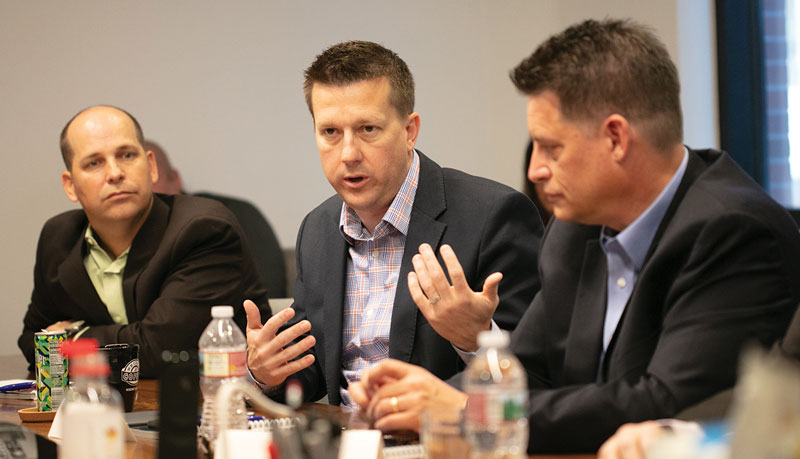
LEFT TO RIGHT: Phillip Hutchins, Rockies Lodging Capital LLC; John Edwards, RLH Corporation; and Brian Fry, Commonwealth Hotels LLC
Others brought up the privacy concerns with using that type of technology. “We just have to get the consumer technology to an enterprise class, to where it is not always listening,” said Edwards. “I think what is a great example is the Google Home that is embedded in the LG TVs now. Some of the new TV solutions in the hotels allow for consumer-grade TVs. We have had to have educational sessions with some of our owners and operators and say, ‘This TV is always listening.’ Depending on the wiretapping laws where your hotel is, all of a sudden, you are at a major risk.”
The television may become the focal point of connectivity for guests in the next 10 years. “So whether that is ordering food or requesting something to your room or even connecting to find out what is happening in the neighborhood, I think that becomes a connection point for everything when you start moving into areas like convergence, whether it be check-in, checkout, whatever it is you want to view, a maintenance order, Grubhub. Now maybe I have that account right on my TV, and you can just order it right from your room,” said Bojanowski.
With all of these technological advances, there is a concern that there may be a loss of guest touchpoints and human interaction. “When there is overreach with technological advancement, it becomes gimmicky or gadgetry just for the sake of trying to differentiate,” said Chris Cheney, VP of hotel performance and analytics with Stonebridge Companies. “I think the root cause of that is the entire guest experience is becoming digital—the booking process, the check-in process without a front desk, getting into the room, checking out without seeing a person. I think brands and operators at large are concerned that we are losing guest touchpoints, human interaction and a place to differentiate with our service.
“There is still so much waiting in the industry on service for us,” he continued. “Are we connecting with guests? Are we delivering what they want? Are we delivering it better than our peers do? So as you are losing human interaction guest touchpoints, brands are trying to desperately replace that with technology touchpoints, and the technology is just not there to really differentiate if you don’t execute it perfectly.”
Too much technology can also be a bad thing. “I think there is a tendency on a large scale to overreach with things like the curtains and lighting on an iPad control,” said Cheney. “Not everyone wants that or needs it; they are just trying to create something to differentiate, but pretty soon, everybody does it, so you are not differentiating any more.”
Barela agreed. “You don’t want intrusive technology,” he said. “I appreciate a text telling me my reservation, check-in time and address of the hotel because it makes it really easy to just click on the address and get directions. What I hate is after I stay at the hotel, the constant texts where you have to block the number. The other thing is, don’t make me download an app for everything. Every time you go to a conference, you have to download their app so you can get around the conference. My phone is full of apps, so when a hotel wants me to download an app, it is an inconvenience.”
When technology doesn’t work flawlessly, it can be worse than not offering the technology at all. “Technology needs to serve a purpose and if it doesn’t serve a purpose, then it is apparently intended for a point of differentiation,” said Bill Linehan, EVP/chief marketing officer with RLH. “If that point of differentiation is not flawless, then it is not working and it is creating more friction. When it serves a purpose, such as keyless entry, it should also not only serve a purpose, but create efficiencies, so that there are savings in other areas… It is about creating options, and when it is creating gimmicks, I think it is incredibly risky because gimmicks are costly, and if they don’t work, then it is even more costly because now, all of a sudden, you’ve got consumers complaining about it.”
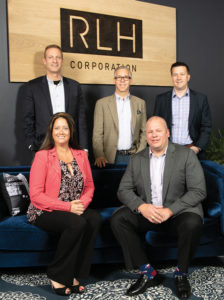
Roundtable sponsors gather for a photo. Clockwise from top left are RLH Corp.’s Paul Sacco, Bill Linehan and John Edwards; and Arthur J. Gallagher & Co.’s Scott Arnim and Jackie Collins.
Beyond guest-facing technology, back-of-the-house innovations were also discussed, especially related to the labor shortage. “I don’t think that anyone here has enough associates today, particularly in the housekeeping department, and I don’t know any of our housekeepers today who are working that hard to put their children through school so that they can become housekeepers,” said Bojanowski. “Immigration levels are down significantly. I don’t think we are going to have a choice but to move to automation in housekeeping, because there just aren’t going to be enough. So whatever functions can be automated—maybe the housekeeper is just a bedmaker and you put the robot in the bathroom to clean it and vacuum [the room]. And maybe we can pay more, and it is a much better job. But I don’t think we are going to have enough employees to run housekeeping in our hotels five years from now, and certainly not 10 years from now.”
And, of course, with technology, it all comes down to data. Edwards noted, “From the back-of-house technology side of things, the newer brands and even the legacy brands have got to adopt a more open architecture for connectivity. For a long time, the brand maintained and controlled system data. I think a lot of the core enterprise solutions are forcing some of the brands to change that. The newer brands that adopt this open architecture or standards-based solutions right from HTNG or HFTP, that allow the owner and operator to be more efficient by saying, ‘Here is the data you need to be able to run your hotel’—that’s huge.”
Fry noted that there are still many brands that do the exact opposite. “They intercede between the owner and the operator and their data to the point where they went on your URLs and you can’t control your message to your guests,” he said. “It feels like a solution based on liability concern, rather than on innovation and embracing the guests.”
“It is a joint issue,” Edwards added. “The legacy concept that the brand owns the data and the brand owns the risk and the brand maintains all of that, while it is valid to some extent, the reality now is that the owner and operator owns just as much of that data and just as much of that risk to some extent.” HB
Check out our video interviews at video.hotelbusiness.com

